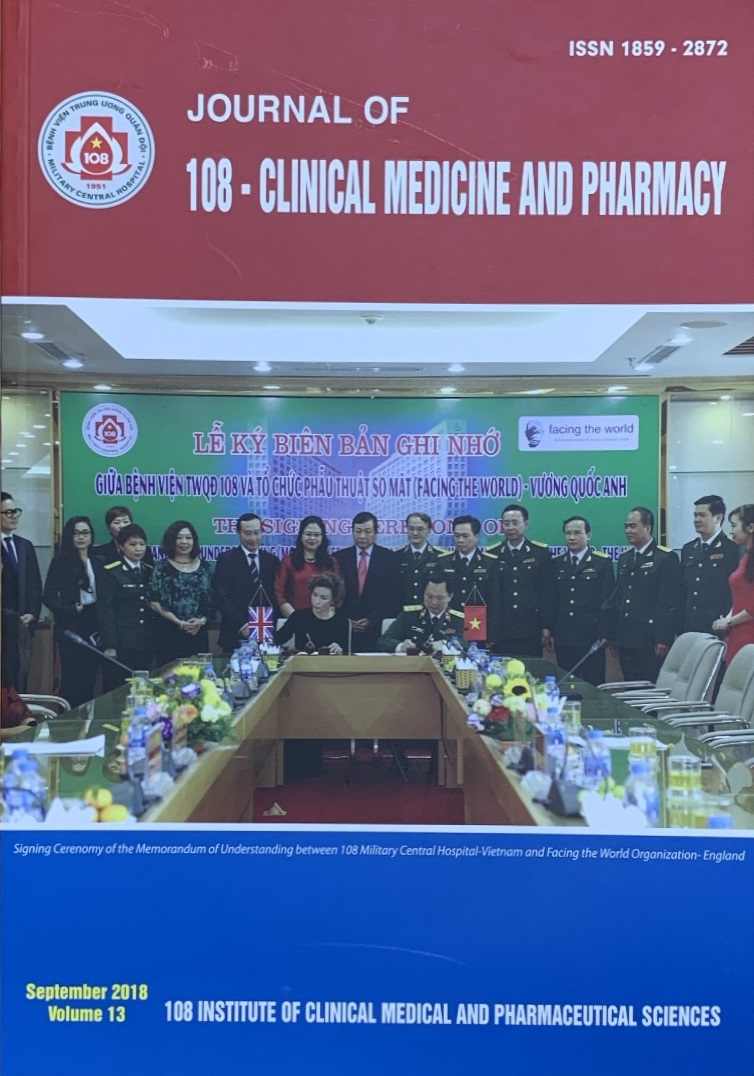The role of contrast enhanced ultrasound for the characterization of hepatocellular carcinoma
Main Article Content
Abstract
Objective: To analyze the hepatocellular carcinoma (HCC) characterizations on contrast enahanced ultrasound and the correlation between these characterizations with tumor size and tumor differentiations. Subject and method: This study included 135 patients with 135 HCC nodules confirmed by histopathology between February 2014 and May 2016. All patients were evaluated by contrast enhanced ultrasound with contrast agent SonoVue (Bracco Company, Netherlands), using US machine (Philips EPIQ 5G, US) that has contrast programe including contrast auto-tracking software ROI, following the Guideline of WFUMB and EFSUMB 2012. Result: Of 135 nodules, 134 nodules (99.3%) presented full enhancement pattern, 01 nodule (0.7%) with non-enhancement pattern, 53 nodules (39.3%) with incomplete enhancement pattern, 65 nodules (48.1%) with heterogeneous enhancement, 43 nodules (31.9%) with necrosis. There were 99.3% of HCCs with enhancement pattern in the arterial phase, 61.5% of HCCs wash-out in the portal phase and 85.9% of HCCs wash-out in the late phase. There were differentiated between HCCs with level’s size (under 20mm, from 20 upto 40mm, from 40mm) and between the well-differentiated HCCs and the moderately to poorly HCCs from hypo-enhancement in the portal phase with statistically significant (p=0.0002 and p=0.0001). Conclusion: The HCCs nodules showed a “fast-in” and “fast-out” enhancement pattern. The wash-out phase correlates with HCCs’ size and differentiations, that plays an important role in predicting the differentiation of HCCs.
Keywords: Contrast enhanced ultrasound, hepatocellular carcinoma.
Article Details
References
2. Bolondi L, Gaiani S, Celli N et al (2005) Characterization of small nodules in cirrhosis by assessment of vascularity: The problem of hypovascular hepatocellular carcinoma. Hepatology 42(1): 27-34.
3. Boozari B, Soudah B, Rifai K et al (2011) Grading of hypervascular hepatocellular carcinoma using late phase of contrast enhanced sonography - a prospective study. Dig Liver Dis 43(6): 484-490.
4. Catalano O, Lobianco R, Cusati B et al (2004) Hepatocellular carcinoma: Spectrum of contrast-enhanced gray-scale harmonic sonography findings. Abdom Imaging 29(3): 341-347.
5. Choi IY, Lee JM, Sirlin CB (2014) CT and MR imaging diagnosis and staging of hepatocellular carcinoma: Part I. Development, growth, and spread: Key pathologic and imaging aspects. Radiology 272: 635-654.
6. Claudon M, Dietrich CF, Choi BI et al (2013) Guidelines and good clinical practice recommendations for contrast enhanced ultrasound (CEUS) in the liver--update 2012: A WFUMB-EFSUMB initiative in cooperation with representatives of AFSUMB, AIUM, ASUM, FLAUS and ICUS. Ultraschall Med 34(1): 11-29.
7. Couinaud C (1957) Le foie: Études Anatomiques et Chirurgicales. Paris, France, Masson: 9-12.
8. Hayashi M, Matsui O, Ueda K et al (2002) Progression to hypervascular hepatocellular carcinoma: Correlation with intranodular blood supply evaluated with CT during intraarterial injection of contrast material. Radiology 225(1): 143-149.
9. Hirohashi S, Ishak KG, Kojiro M et al (2000) Hepatocellular carcinoma. In: Aaltonen LA, Hamilton SR (eds). Pathology and Genetics of Tumors of the Digestive System: 159-172.
10. Kudo M (2002) Imaging blood flow characteristics of hepatocellular carcinoma. Oncology 62(1): 48-56.
11. Kudo M, Izumi N, Kokudo N, et al (2011) Management of hepatocellular carcinoma in Japan: Consensus-Based Clinical Practice Guidelines proposed by the Japan Society of Hepatology (JSH) 2010 updated version. Dig Dis 29(3): 339-364.
12. Mohamed AM, Elmaaty MEGA, Ibrahim AM et al (2014) Diagnosis of arterioportal shunts in cases of hepatocellular carcinoma using multidetector CT: Impact on clinical management. The Egyptian Journal of Radiology and NuclearMedicine 45: 25-33.
13. Moon WS, Rhyu KH, Kang MJ et al (2003) Overexpression of VEGF and angiopoietin 2: A key to high vascularity of hepatocellular carcinoma?. Mod Pathol 16(6): 552-557.
14. Omata M, Lesmana LA, Tateishi R et al (2010) Asian Pacific Association for the Study of the liver consensus recommendations on hepatocellular carcinoma. Hepatol Int 4(2): 439-474.
15. Yang ZF, Poon RT (2008) Vascular changes in hepatocellular carcinoma. Anat Rec (Hoboken), 291(6): 721-734.
 ISSN: 1859 - 2872
ISSN: 1859 - 2872
